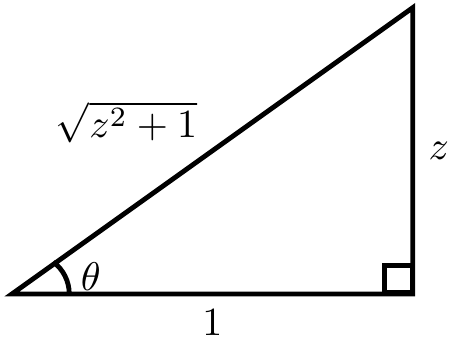Difference between revisions of "Arctan"
| Line 13: | Line 13: | ||
$$\dfrac{d}{dz} \mathrm{arctan}(z) = \dfrac{1}{z^2+1}$$ | $$\dfrac{d}{dz} \mathrm{arctan}(z) = \dfrac{1}{z^2+1}$$ | ||
<div class="mw-collapsible-content"> | <div class="mw-collapsible-content"> | ||
| − | <strong>Proof:</strong> If $ | + | <strong>Proof:</strong> If $\theta=\mathrm{arctan}(z)$ then $\tan \theta = z$. Now use [[implicit differentiation]] with respect to $z$ yields |
| − | $$\sec^2( | + | $$\sec^2(\theta)\theta'=1.$$ |
| − | Substituting back in $ | + | The following triangle shows that $\sec^2(\mathrm{arctan}(z))=z^2+1$: |
| + | [[File:Sec(arctan(z)).png|200px|center]] | ||
| + | Substituting back in $\theta=\mathrm{arccos(z)}$ yields the formula | ||
$$\dfrac{d}{dz} \mathrm{arccos(z)} = \dfrac{1}{\sec^2(\mathrm{arctan(z)})} = \dfrac{1}{z^2+1}. █$$ | $$\dfrac{d}{dz} \mathrm{arccos(z)} = \dfrac{1}{\sec^2(\mathrm{arctan(z)})} = \dfrac{1}{z^2+1}. █$$ | ||
</div> | </div> | ||
Revision as of 05:39, 31 October 2014
The $\mathrm{arctan}$ function is the inverse function of the tangent function.
- Arctan.png
Graph of $\mathrm{arctan}$ on $[-1,1]$.
- Complex arctan.jpg
Domain coloring of the analytic continuation of $\mathrm{arctan}$.
Properties
Proposition: $$\dfrac{d}{dz} \mathrm{arctan}(z) = \dfrac{1}{z^2+1}$$
Proof: If $\theta=\mathrm{arctan}(z)$ then $\tan \theta = z$. Now use implicit differentiation with respect to $z$ yields $$\sec^2(\theta)\theta'=1.$$ The following triangle shows that $\sec^2(\mathrm{arctan}(z))=z^2+1$:
Substituting back in $\theta=\mathrm{arccos(z)}$ yields the formula $$\dfrac{d}{dz} \mathrm{arccos(z)} = \dfrac{1}{\sec^2(\mathrm{arctan(z)})} = \dfrac{1}{z^2+1}. █$$
Proposition: $$\int \mathrm{arctan}(z) = z\mathrm{arctan}(z) - \dfrac{1}{2}\log(1+z^2)+C$$
Proof: █
Proposition: $$\mathrm{arctan}(z) = \mathrm{arccot}\left( \dfrac{1}{z} \right)$$
Proof: █
